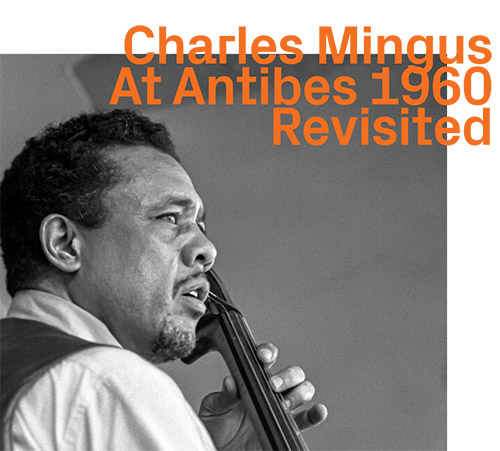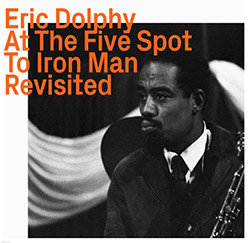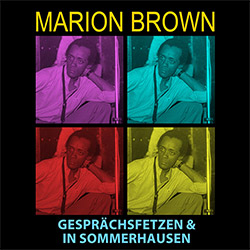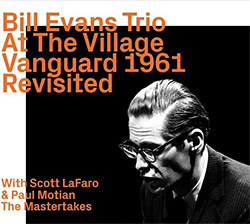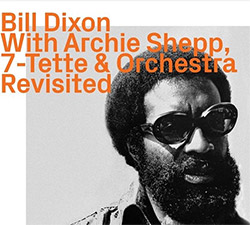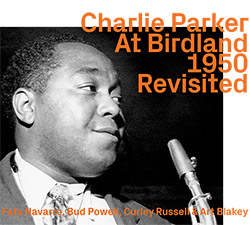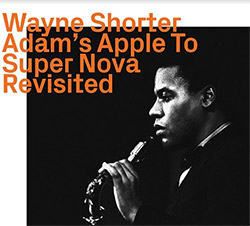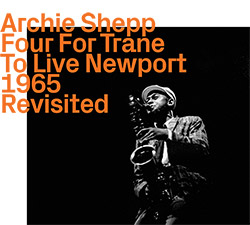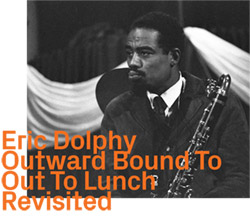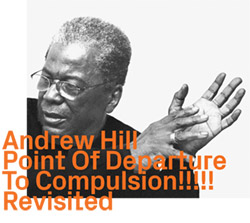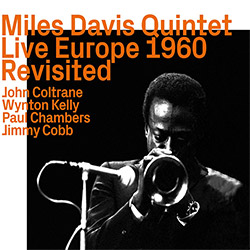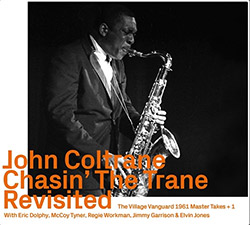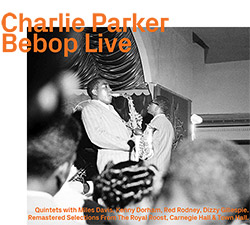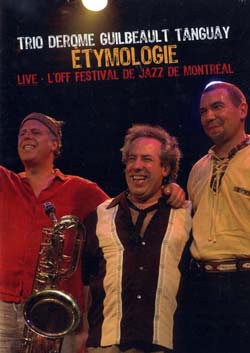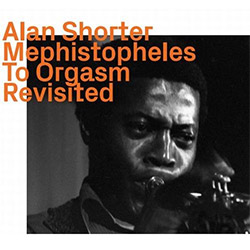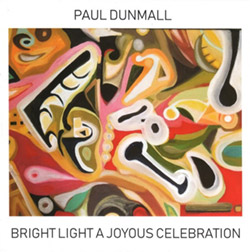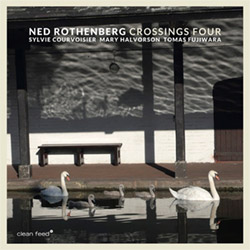
Restoring and remastering the 1979 Atlantic album Mingus at Antibes from bassist & composer Charles Mingus, an extraordinary concert from the 1960 Antibes Jazz Festival with the masterful sextet of Eric Dolphy on alto sax & bass clarinet, Ted Curson on trumpet, Booker Ervin on tenor saxophone, and Dannie Richmond on drums, with Bud Powell or Mingus himself on piano.
In Stock
Quantity in Basket: None
Log In to use our Wish List
Shipping Weight: 2.00 units
Sample The Album:
Charles Mingus-double bass, piano
Ted Curson-trumpet
Eric Dolphy-alto saxophone, bass clarinet
Booker Ervin-tenor saxophone
Bud Powell-piano
Dannie Richmond-drums
Click an artist name above to see in-stock items for that artist.
UPC: 752156115823
Label: ezz-thetics by Hat Hut Records Ltd
Catalog ID: ezz-thetics 1158
Squidco Product Code: 33578
Format: CD
Condition: New
Released: 2023
Country: Switzerland
Packaging: Cardboard Gatefold
Recorded at the Antibes Jazz Festival, in Juan-les-Pins, France, on July 13th, 1960.
Originally released in 1979 as a vinyl 2-LP set titled Mingus at Antibes on the Atlantic label with catalog code SD 2-3001.
"Mingus the visionary composer. Mingus the virtuoso bassist. Mingus the volcanic bandleader. As the 1960s began, with the new decade bringing a radically expansive new view of the possibilities of jazz expression, Charles Mingus, by virtue of his brilliantly nonconformist creative imagination, willingness to take risks along experimental paths, and (because of, or in spite of) an oft-times confrontational rebellious nature, had established himself among those in the forefront of the music's modernist push. His earliest, ambitious compositions for large ensembles in the late '40s (many not recorded until years later) visited territories ranging from Ellingtonian lyricism to Richard Strauss-inspired tone poetry, and his '50s ventures included adventurous Jazz Workshop investigations in tonality and formal designs as well as dynamic reconfigurations of his gospel and blues roots. But the band he brought to the July 1960 jazz festival in Antibes, France, was to prove one of the pivotal, most impactful and exhilarating, of his career.
There's little doubt that Mingus' compositional perspective focused on large ensembles - ideally, orchestral - but economic realities and the popularity of small band performance venues denied him such opportunities. His method of dealing with this was to devise groups ranging from six to ten pieces, with multiple horn front lines, for his recording sessions beginning in 1953 through '73 (only the Pithecanthropus Erectus and The Clown dates, plus one trio with pianist Hampton Hawes, and the Candid quartet, broke this pattern), that allowed him the voicings he needed for timbral contrasts, countermelodies, propulsive riffs behind soloists, and group polyphony. The size of the band for live performances would depend upon the circumstances of the gig. The construction of the group he brought to Antibes represented a shrewd stylistic breadth - Ted Curson as both swing and post-bop trumpeter, Booker Ervin the blues-tinged tenor saxist, Eric Dolphy's alto sax on the cusp of free jazz, and drummer Dannie Richmond as the rhythmically loose cannon.
Yet the most unconventional aspect of this band is the lack of a pianist. As can be heard, Mingus himself added piano details at times here (and his brilliant bass playing holds the group together throughout), but the germ of his decision likely had to do with the emergence of Ornette Coleman. On the rare previous occasions, live or in the studio, when Mingus failed to hire a pianist he typically made sure vibist Teddy Charles was on hand to supply harmonic support. But the Antibes performance reflects the same attitude that would lead to the acclaimed Candid quartet recording just three months later. If Mingus the composer inevitably sought musical expression of his own multifaceted personalities, his role as bandleader - beyond the varied interpretive presentation of his pieces - was to provoke his soloists into a new, if equally personal, mode of spontaneous creativity, ultimately free of the overpowering influence of Charlie Parker. Thus regarding Ornette, he told Leonard Feather in down beat published just two months before Antibes, "Now aside from the fact that I doubt he can even play a C scale in tune, the fact remains that his notes and lines are so fresh. ... I'm not saying everybody's going to have to play like Coleman. But they're going to have to stop playing Bird."
The material Mingus chose for the festival looks back to the recent past and ahead to the future, but significantly the absence of piano opens up the harmonic environment and frees the background for unpredictable horn responsibilities. Arranged to suggest larger forces, the horns provide spirited riffs and supportive or contrasting lines behind the soloist - most remarkably on "Folk Forms I," where the thematic polyphony builds tumultuous tension. According to Mingus scholar Brian Priestley, this tune and "What Love" (an abstraction of "What is This Thing Called Love") are actually the oldest, having been conceived in the late '40s and early '50s, respectively. "Wednesday Night Prayer Meeting" and "Better Git Hit in Your Soul" date from 1959 Atlantic and Columbia sessions, here receiving soulful Ervin and chromatic inside-out Dolphy excursions. "Prayer for Passive Resistance" was the newest, appearing earlier in '60 on the Pre-Bird/Mingus Revisited album. The addition of Bud Powell on the rambunctious "I'll Remember April" was simultaneously a nod to Mingus' musical past (remember, Mingus was bassist on the famous 1953 Massey Hall all-star date) and a nudge towards future developments.
Just three months later Mingus took that next step, exploiting the freedoms of a pianoless quartet, including extended spontaneous re-adaptations of "Folk Forms" and "What Love." However, as successful as this experiment was, Mingus, the resourceful and romantic composer, was unwilling to sacrifice his creative vision for the potential discoveries of improvisational collaboration, and looked thereafter to resume his odyssey of self-discovery and personal expression. Only now can we clearly see how necessary this Antibes performance was to test and confirm the qualities that made Mingus unique."-Art Lange, Chicago, July 2023
Artist Biographies
• Show Bio for Charles Mingus "One of the most important figures in twentieth century American music, Charles Mingus was a virtuoso bass player, accomplished pianist, bandleader and composer. Born on a military base in Nogales, Arizona in 1922 and raised in Watts, California, his earliest musical influences came from the church-- choir and group singing-- and from "hearing Duke Ellington over the radio when [he] was eight years old." He studied double bass and composition in a formal way (five years with H. Rheinshagen, principal bassist of the New York Philharmonic, and compositional techniques with the legendary Lloyd Reese) while absorbing vernacular music from the great jazz masters, first-hand. His early professional experience, in the 40's, found him touring with bands like Louis Armstrong, Kid Ory and Lionel Hampton. Eventually he settled in New York where he played and recorded with the leading musicians of the 1950's-- Charlie Parker, Miles Davis, Bud Powell, Art Tatum and Duke Ellington himself. One of the few bassists to do so, Mingus quickly developed as a leader of musicians. He was also an accomplished pianist who could have made a career playing that instrument. By the mid-50's he had formed his own publishing and recording companies to protect and document his growing repertoire of original music. He also founded the "Jazz Workshop," a group which enabled young composers to have their new works performed in concert and on recordings. Mingus soon found himself at the forefront of the avant-garde. His recordings bear witness to the extraordinarily creative body of work that followed. They include: Pithecanthropus Erectus, The Clown, Tijuana Moods, Mingus Dynasty, Mingus Ah Um, The Black Saint and the Sinner Lady, Cumbia and Jazz Fusion, Let My Children Hear Music. He recorded over a hundred albums and wrote over three hundred scores. Although he wrote his first concert piece, "Half-Mast Inhibition," when he was seventeen years old, it was not recorded until twenty years later by a 22-piece orchestra with Gunther Schuller conducting. It was the presentation of "Revelations" which combined jazz and classical idioms, at the 1955 Brandeis Festival of the Creative Arts, that established him as one of the foremost jazz composers of his day. In 1971 Mingus was awarded the Slee Chair of Music and spent a semester teaching composition at the State University of New York at Buffalo. In the same year his autobiography, Beneath the Underdog, was published by Knopf. In 1972 it appeared in a Bantam paperback and was reissued after his death, in 1980, by Viking/Penguin and again by Pantheon Books, in 1991. In 1972 he also re-signed with Columbia Records. His music was performed frequently by ballet companies, and Alvin Ailey choreographed an hour program called "The Mingus Dances" during a 1972 collaboration with the Robert Joffrey Ballet Company. He toured extensively throughout Europe, Japan, Canada, South America and the United States until the end of 1977 when he was diagnosed as having a rare nerve disease, Amyotrophic Lateral Sclerosis. He was confined to a wheelchair, and although he was no longer able to write music on paper or compose at the piano, his last works were sung into a tape recorder. From the 1960's until his death in 1979 at age 56, Mingus remained in the forefront of American music. When asked to comment on his accomplishments, Mingus said that his abilities as a bassist were the result of hard work but that his talent for composition came from God. Mingus received grants from the National Endowment for the Arts, The Smithsonian Institute, and the Guggenheim Foundation (two grants). He also received an honorary degree from Brandeis and an award from Yale University. At a memorial following Mingus' death, Steve Schlesinger of the Guggenheim Foundation commented that Mingus was one of the few artists who received two grants and added: "I look forward to the day when we can transcend labels like jazz and acknowledge Charles Mingus as the major American composer that he is." The New Yorker wrote: "For sheer melodic and rhythmic and structural originality, his compositions may equal anything written in western music in the twentieth century." He died in Mexico on January 5, 1979, and his wife, Sue Graham Mingus, scattered his ashes in the Ganges River in India. Both New York City and Washington, D.C. honored him posthumously with a "Charles Mingus Day." [...]"-Reprinted in part from More than a Fake Book © 1991 Jazz Workshop, Inc. ^ Hide Bio for Charles Mingus • Show Bio for Ted Curson "Theodore Curson (June 3, 1935 - November 4, 2012) was an American jazz trumpeter. Curson was born in Philadelphia. He became interested in playing trumpet after watching a newspaper salesman play a silver trumpet. Curson's father, however, wanted him to play alto saxophone like Louis Jordan. When he was ten, he gained his first trumpet. He attended Granoff School of Music in Philadelphia. At the suggestion of Miles Davis, he moved to New York in 1956. He performed and recorded with Cecil Taylor in the late 1950s and early 1960s. His composition "Tears for Dolphy" has been used in numerous films. He was featured in a profile on composer Graham Collier in the 1985 Channel 4 documentary 'Hoarded Dreams' He was a familiar face in Finland, having performed at the Pori Jazz festival every year since it began in 1966. In 2007, he performed at Finland's Independence Day Ball at the invitation of president Tarja Halonen. A longtime resident of Montclair, New Jersey, Curson died from a heart attack in the township on November 4, 2012." ^ Hide Bio for Ted Curson • Show Bio for Eric Dolphy "Eric Allan Dolphy Jr. (June 20, 1928 - June 29, 1964) was an American jazz alto saxophonist, bass clarinetist and flautist. On a few occasions, he also played the clarinet and piccolo. Dolphy was one of several multi-instrumentalists to gain prominence in the same era. His use of the bass clarinet helped to establish the instrument within jazz. Dolphy extended the vocabulary and boundaries of the alto saxophone, and was among the earliest significant jazz flute soloists. His improvisational style was characterized by the use of wide intervals, in addition to employing an array of extended techniques to emulate the sounds of human voices and animals. He used melodic lines that were "angular, zigzagging from interval to interval, taking hairpin turns at unexpected junctures, making dramatic leaps from the lower to the upper register." Although Dolphy's work is sometimes classified as free jazz, his compositions and solos were often rooted in conventional (if highly abstracted) tonal bebop harmony." ^ Hide Bio for Eric Dolphy • Show Bio for Booker Ervin "Booker Telleferro Ervin II (October 31, 1930 - August 31, 1970) was an American tenor saxophone player. His tenor playing was characterised by a strong, tough sound and blues/gospel phrasing. He is remembered for his association with bassist Charles Mingus. Ervin was born in Denison, Texas, United States. He first learned to play trombone at a young age from his father, who played the instrument with Buddy Tate. After leaving school, Ervin joined the United States Air Force, stationed in Okinawa, Japan, during which time he taught himself tenor saxophone. After completing his service in 1953, he studied at Berklee College of Music in Boston, Massachusetts. Moving to Tulsa in 1954, he played with the band of Ernie Fields. After stays in Denver and Pittsburgh, Ervin moved to New York City in spring 1958, initially working a day job and playing jam sessions at night. Ervin then worked with Charles Mingus regularly from late 1958 to 1960, rejoining various outfits led by the bassist at various times up to autumn 1964, when he departed for Europe. During the mid-1960s, Ervin led his own quartet, recording for Prestige Records with, among others, ex-Mingus associate pianist Jaki Byard, along with bassist Richard Davis and Alan Dawson on drums. Ervin later recorded for Blue Note Records and played with pianist Randy Weston, with whom he recorded between 1963 and 1966. Weston said: "Booker Ervin, for me, was on the same level as John Coltrane. He was a completely original saxophonist.... He was a master.... 'African Cookbook', which I composed back in the early '60s, was partly named after Booker because we (musicians) used to call him 'Book,' and we would say, 'Cook, Book.' Sometimes when he was playing we'd shout, 'Cook, Book, cook.' And the melody of 'African Cookbook' was based upon Booker Ervin's sound, a sound like the north of Africa. He would kind of take those notes and make them weave hypnotically. So, actually the African Cookbook was influenced by Booker Ervin." Between October 1964 to summer 1966, Ervin worked and lived in Europe, playing gigs in France, Spain, Italy, Germany, Norway, Sweden, Denmark and The Netherlands. Basing himself in Barcelona, Spain, he featured regularly at the city's Jamboree Club. He recorded and broadcast while overseas, making albums with his own quartet, Dexter Gordon and Catalan vocalist Núria Feliu, featuring on various radio programmes and appearing at several jazz festivals, including a guest slot at the 1965 Berlin Jazz Festival, during which he performed a 25-minute improvisation. This performance was issued as "Blues For You" on the album Lament For Booker Ervin (Enja Records) in 1977. Following his return to the United States in summer 1966, Ervin led his own groups in jazz clubs throughout the country, and appeared at both the Newport Jazz Festival (1967) and the Monterey Jazz Festival (1966) performing with Randy Weston; a recording of their performance was issued on CD in 1994. In 1968, Ervin again appeared at clubs and festivals in Scandinavia, broadcasting with the Danish Radio Big Band. He recorded again for Prestige, but in late 1966 was signed to West Coast label, Pacific Jazz, for whom he taped two albums, Structurally Sound and Booker 'n' Brass (1967), before switching to Blue Note. Ervin recorded two Blue Note albums under his own name, In Between and Tex Book Tenor, the latter going unissued during his lifetime, initially being released in the 1970s as part of a double album shared with recordings (on which Ervin features) made under the leadership of Horace Parlan (Back from the Gig). In 2005, Blue Note issued as single CD of Tex Book Tenor in its limited edition Connoisseur series. Ervin's final recorded appearance occurred in January 1969, when he guested on a further Prestige album headed by teenage multi-instrumentalist Eric Kloss. Ervin died of kidney disease in New York City in 1970, aged 39. Most biographical accounts of Ervin's death give an incorrect date. His gravestone in The National Cemetery, East Farmingdale, New York, clearly shows the date as August 31, 1970. In 2017, Ervin was the subject of a mini-biography written by English saxophonist and author Simon Spillett, published as part of an anthology package titled The Good Book (Acrobat Records)." ^ Hide Bio for Booker Ervin • Show Bio for Bud Powell "Earl Rudolph "Bud" Powell (September 27, 1924 Ð July 31, 1966) was an American jazz pianist and composer. Along with Charlie Parker, Thelonious Monk, and Dizzy Gillespie, Powell was a leading figure in the development of bebop. His virtuosity led many to call him the Charlie Parker of the piano.[citation needed] Powell was also a composer, and many jazz critics credit his works and his playing as having "greatly extended the range of jazz harmony." Powell's father was a stride pianist. Powell started classical piano lessons at the age of five. His teacher, hired by his father, was a West Indian man named Rawlins. At ten, Powell showed interest in the swing music that could be heard all over the neighborhood. He first appeared in public at a rent party, where he mimicked Fats Waller's playing style. The first jazz composition that he mastered was James P. Johnson's "Carolina Shout". Powell's older brother, William, played trumpet and violin, and by the age of 15 Powell was playing in William's band. Powell heard Art Tatum on the radio and tried to match his technique. Powell's younger brother, Richie Powell, was also a noted bebop pianist. In his youth Powell listened to the adventurous performances at Uptown House, a venue near his home. This was where Charlie Parker first appeared as a solo act when he briefly lived in New York. Thelonious Monk played at Uptown House. When Monk met Powell he introduced Powell to musicians who were starting to play bebop at Minton's Playhouse. Monk was a resident pianist, and he presented Powell as his protg. Their mutual affection grew, and Monk became Powell's greatest mentor. Powell eagerly experimented with Monk's idea. Monk's composition "In Walked Bud" is a tribute to their time together in Harlem. Powell was engaged in a series of dance bands, his incubation culminating in becoming the pianist for the swing orchestra of Cootie Williams. In late 1943 he was offered the chance to appear at a nightclub with the quintet of Oscar Pettiford and Dizzy Gillespie, but Powell's mother decided he would continue with the more secure job with the popular Williams. Powell was the pianist on a handful of Williams's recording dates in 1944. The last included the first recording of Monk's "'Round Midnight". His job with Williams was terminated in Philadelphia in January 1945. After the band finished for the night, Powell wandered near Broad Street Station and was apprehended, drunk, by the private railroad police. He was beaten by them and incarcerated briefly by the city police. Ten days after his release, his headaches persisted and he was hospitalized at Bellevue, an observation ward, and then in a state psychiatric hospital sixty miles away. He remained there for two and a half months. Powell resumed playing in Manhattan after released. In 1945Ð46 he recorded with Frank Socolow, Sarah Vaughan, Dexter Gordon, J. J. Johnson, Sonny Stitt, Fats Navarro, and Kenny Clarke. Powell became known for his sight-reading and his skill at fast tempos. On January 10, 1947, Powell recorded his first session as a leader, which included 8 pieces for De Luxe Records with Max Roach and Curly Russell as accompanists. The recordings were unreleased until 1949, when Roost Records bought the masters and released them on a series of 78 rpm records. Musicologist Guthrie Ramsey wrote of the session that "Powell proves himself the equal of any of the other beboppers in technique, versatility, and feeling." Charlie Parker chose Powell to be his pianist on a May 1947 quintet recording session with Miles Davis, Tommy Potter, and Max Roach; this was the only studio session in which Parker and Powell played together. [...]" ^ Hide Bio for Bud Powell • Show Bio for Dannie Richmond "Charles Daniel Richmond (December 15, 1931 - March 16, 1988) was an American jazz drummer who is best known for his work with Charles Mingus. He also worked with Joe Cocker, Elton John and Mark-Almond. Richmond was born Charles Daniel Richmond on December 15, 1931, in New York City and grew up in Greensboro, North Carolina. He started playing tenor saxophone at the age of thirteen, and went on to play R&B with the Paul Williams band in 1955. His career took off when he took up the drums, which he had taught himself to play in his early twenties, through the formation of what was to be a 21-year association with Charles Mingus. Mingus biographer Brian Priestley writes that "Dannie became Mingus's equivalent to Harry Carney in the Ellington band, an indispensable ingredient of 'the Mingus sound' and a close friend as well". That association continued after Mingus' death when Richmond became the first musical director of the group Mingus Dynasty in 1980. He died of a heart attack in Harlem on March 16, 1988, at the age of 56." ^ Hide Bio for Dannie Richmond
4/24/2024
Have a better biography or biography source? Please Contact Us so that we can update this biography.
4/24/2024
Have a better biography or biography source? Please Contact Us so that we can update this biography.
4/24/2024
Have a better biography or biography source? Please Contact Us so that we can update this biography.
4/24/2024
Have a better biography or biography source? Please Contact Us so that we can update this biography.
4/24/2024
Have a better biography or biography source? Please Contact Us so that we can update this biography.
4/24/2024
Have a better biography or biography source? Please Contact Us so that we can update this biography.
Track Listing:
1. Prayer For Passive Resistance 8:12
2. Wednesday Night Prayer Meeting 12:03
3. Better Git Hit In Your Soul 11:20
4. Folk Forms I 11:38
5. What Love? 13:57
6. I'll Remember April 13:49
Hat Art
Improvised Music
Jazz
Free Improvisation
Melodic and Lyrical Jazz
Sextet Recordings
Staff Picks & Recommended Items
New in Improvised Music
Search for other titles on the label:
ezz-thetics by Hat Hut Records Ltd.


